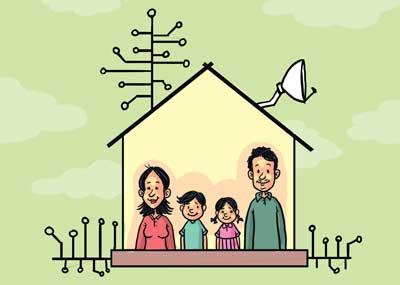08 May 2021 - {{hitsCtrl.values.hits}}
For ages and generations good families have been the nucleus of a good society. Responsible and duty conscious parents have helped to nurture good children who turn out to be civic conscious citizens. They get involved in maintaining the rule of law, democratic freedom, dismantling the structures that keep the rich richer and the poor poorer, get actively involved in poverty alleviation, climate change and other global issues including the task of finding a remedy to the current COVID-19 pandemic.
 Spirituality also tells us that a family which stays together is a family that prays or meditates together. Basic good manners and habits are also taught and practised in a good family. For instance, there are three keywords that we need to learn in the family and we will carry them into society. The words are please, sorry and thanks. We often do this in our workplaces or elsewhere but seldom in the family. We need to learn to say please when we want something from someone in the family, say thanks when we receive it and sincerely say sorry when we do something wrong or offend someone in the family.
Spirituality also tells us that a family which stays together is a family that prays or meditates together. Basic good manners and habits are also taught and practised in a good family. For instance, there are three keywords that we need to learn in the family and we will carry them into society. The words are please, sorry and thanks. We often do this in our workplaces or elsewhere but seldom in the family. We need to learn to say please when we want something from someone in the family, say thanks when we receive it and sincerely say sorry when we do something wrong or offend someone in the family.
While this will always be true, Megatrends, including new technologies, rapid urbanisation and migration, demographic and climate change, have been dramatically shaping our world, the United Nations points out in a statement to mark the International Day of Families in preparation for the Thirtieth Anniversary of the International Year of the Family in 2024. The UN Department of Economic and Social Affairs aims to raise awareness of the megatrends, their impact on families and responsive family-oriented policies to tackle their effects.
This year’s theme is families and new technologies, and it focuses on the impacts of new technologies on the well-being of families while it also follows up on the theme of the 59th session of the Commission for Social Development. Socially just transition towards sustainable development: the role of digital technologies on social development and well-being of all is the main thrust of the commission.
According to the UN, The prolonged COVID-19 pandemic has demonstrated the importance of digital technologies for work, education and communication. The pandemic has accelerated technological changes that had already been underway both in society and at work, including the expanded use of digital platforms and related technological innovations like cloud computing and the use of big data and algorithms. As a result, innovative ways of working as well as flexibility for both employees and employers have been on the rise.
On the other hand, concerns have been raised over some negative impacts relating to technology. These include ‘screen fatigue’ and cyberbullying. In addition, school closures and increased demand for working from home have exacerbated already growing concerns over rising levels of parental burnout which can be linked to long-term negative impacts on child well-being. Now, more than ever, parents and caregivers, especially those engaged in full-time employment, need resources to successfully manage their parenting obligations. With the growing field of innovative technologies, new digital technologies have the potential to empower parents to meet such obligations successfully. In exploring the impact of new technologies on families, the observance of the International Day of Families will focus, in particular, on the current state and future potential of digital technologies in advancing parenting education.
Parenting education can be defined as interventions or services aimed at improving parenting interactions, behaviours, knowledge, beliefs, attitudes and practices, and encompassing strategies of positive parenting, psychosocial stimulation and maltreatment prevention. Parenting education is key for empowering parents to ensure children’s and family well-being and is fundamental to ensure children’s healthy development. In times of the COVID-19 pandemic, as children pursue hybrid or full-time remote learning, the engagement of parents at home is indispensable to enable continuous learning and ensure mental and physical well-being of children, the UN says.
Whether digital or not, for families the greatest is love. As sacred writing says, love is patient and kind not haughty, selfish or rude, and it expects the best from others. If I speak in many languages, but do not have love, I am only a resounding gong or a clanging cymbal. If I have the gift of prophecy and can fathom all mysteries and all knowledge, and if I have a faith that can move mountains, but do not have love, I am nothing.If I give all I possess to the poor and give over my body to hardship that I may boast, but do not have love, I gain nothing.
29 Nov 2024 30 minute ago
29 Nov 2024 49 minute ago
29 Nov 2024 2 hours ago
29 Nov 2024 4 hours ago
29 Nov 2024 4 hours ago